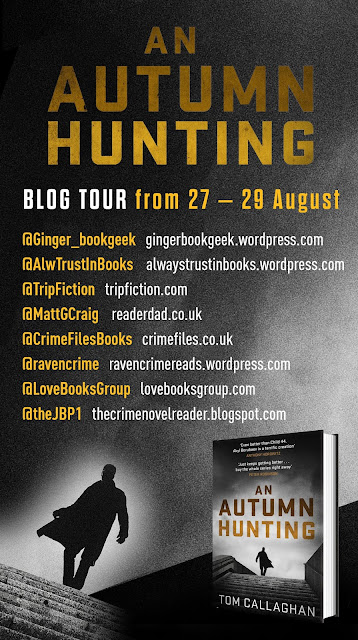Tom Callaghan is the author of an excellent series of novels to feature Akyl Borubaev of the Bishkek Murder Squad. I've followed the series from book one, An Authumn Hunting being the fourth instalment afterA Killing Winter (which I reviewed here: https://bit.ly/2Nbf2Ay; A Spring Betrayal (see here for my review: https://bit.ly/2OTXpFM); and A Summer Revenge: (https://bit.ly/2BAjCa7). I caught up with Tom to pick his brains for one of my Q&A's.
Where did you get the idea behind An Autumn Hunting?
Each of the Akyl Borubaev books has a loose theme - political corruption, paedophilia, trafficking - and for AN AUTUMN HUNTING, drugs were the central theme. Of course, it’s a worldwide issue, but I wanted to suggest how it might apply to Kyrgyzstan. But as always, that sounds rather more intentional and plotted than how I actually write.
I’m a big fan of your Akyl Borubaev series, they have a tremendous sense of place, as indeed does An Autumn Hunting. You clearly know the region well. How did your relationship with the area come about and what made you choose to base your novels there?
I married a Kyrgyz woman and acquired a 7-year-old stepson. He’s now 21, towers over me, and we live together in Bishkek. So naturally, I know large parts of Kyrgyzstan very well, and having family there obviously gives me insights not usually afforded to tourists.
Why Kyrgyzstan? Well, all the usual locations - NYC, LA, London, Miami and so on - have been done to death, and to try to better the masters like Chandler, Hammett and Leonard in those places would be horribly daunting.
Kyrgyzstan has had two revolutions since independence from the USSR; lots of crime and corruption; poverty… what more could a crime writer ask for? For example, only a few days ago, someone tried to kill a Russian businessman with a bomb, two streets away from where I live. They failed, but there’s a story behind that which could be very interesting.
How do you get your ideas? What’s the process and how do they go from vague inspiration to fully fleshed out notions?
My main concern, to sound rather pretentious, is to explore Akyl’s changing view of the world and himself, and his relationship with Saltanat. The crime aspects of the books serve to help bring them together, or to keep them apart. Part of my job is to be true to Akyl’s character as revealed through his thoughts and actions, so I tend to let that take me where the characters determine. I have a vague idea that I want to go from A to Z, but I don’t travel in alphabetical order, visiting every letter, if that makes sense.
Tell me about the research that goes into your writing?
Living here does a lot of the research for me. Again, family tell me about a lot of local events. And I just make the rest up.
Are you a plotter or a pantser?
Pantser, for sure. If I can surprise myself with what I write, there’s a vague hope of being able to do the same for my readers.
I’m interested in whydunnit, not whodunit; my books don’t involve murder in the library with a candlestick, and I have no interest in ‘crossword puzzle’ mysteries. I find Agatha Christie-style ‘Golden Age’ mysteries unreadable; my little grey cells are completely disinterested.
As a pantser, how do you make sure you don’t go off on wild tangents?
Who says wild tangents are a bad thing? They might be the most interesting part of the journey.
Tell me about your writing, do you write full time?
I try to, when the need to do the washing up doesn’t feel too overwhelming and urgent.
When is your most productive period of the day?
Whenever the logjam of life temporarily opens.
Is any part of your writing biographical or are any of those characters inspired by real people?
No, but remember I tell stories for a living.
An Autumn Hunting is the fourth novel in the series and the titles are taken from the seasons, which implies it will be the final instalment. Will there be a fifth novel in the series? If so, can you tell us anything about that?
I’m just finishing a new book, but superstition forbids me saying any more about it, other than Donald Trump isn’t in it.
What other writing projects are you working on?
For some reason, calling writing a ‘project’ seems to diminish it for me, like calling it a hobby. (Read Basil Bunting’s poem, ‘What the Chairman told Tom’.) There’s a moment in ‘The Shining’ where Jack Nicholson says he welcomes the solitude to finish a ‘writing project’, and I knew then he was mad.
Finally, I’m going to shamelessly poach two questions the author Mark Hill (author of His First Lie and It Was Her) used to put to writers on his blog. Like me, Mark was a book blogger before he became a successful author and I like to think that the answers to these questions helped him glean valuable help for his own writing. Certainly, reading them on his blog is helping me. So here goes:
What’s the hardest lesson you ever had to learn about writing?
The washing up/ laundry/ cooking/ gazing out of the window can all wait.
Give me some advice about writing?
Read as much as you can in the genre you love, but not exclusively so. Then read some more.
Hunt down your stylistic tropes and put them to death.
Never tell people the plot of your book; you’ll lose interest in telling it on the page.
Avoid praise; seek only criticism - that’s what helps you write better (or less badly).
Just get on with it; your laptop has a delete button after all. Dreaming about the perfect sentence usually means you just end up dreaming.



